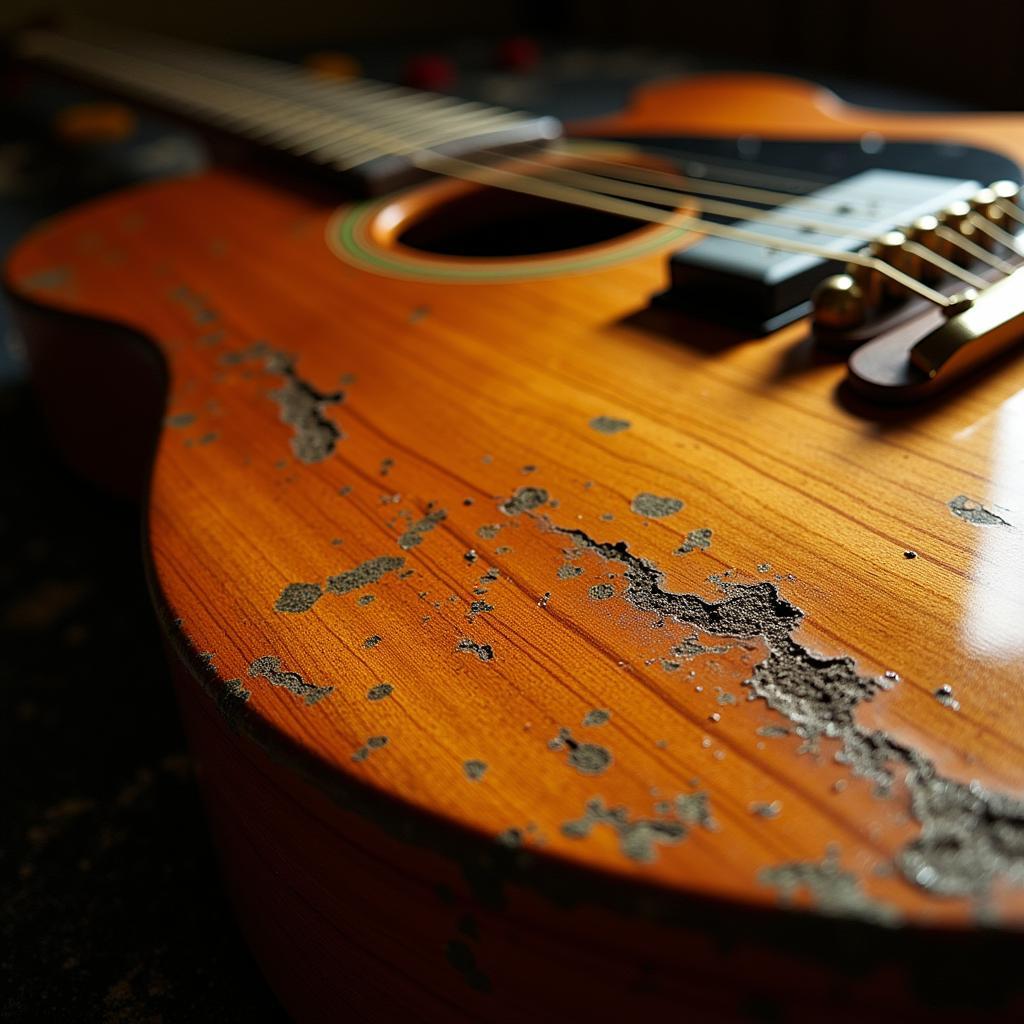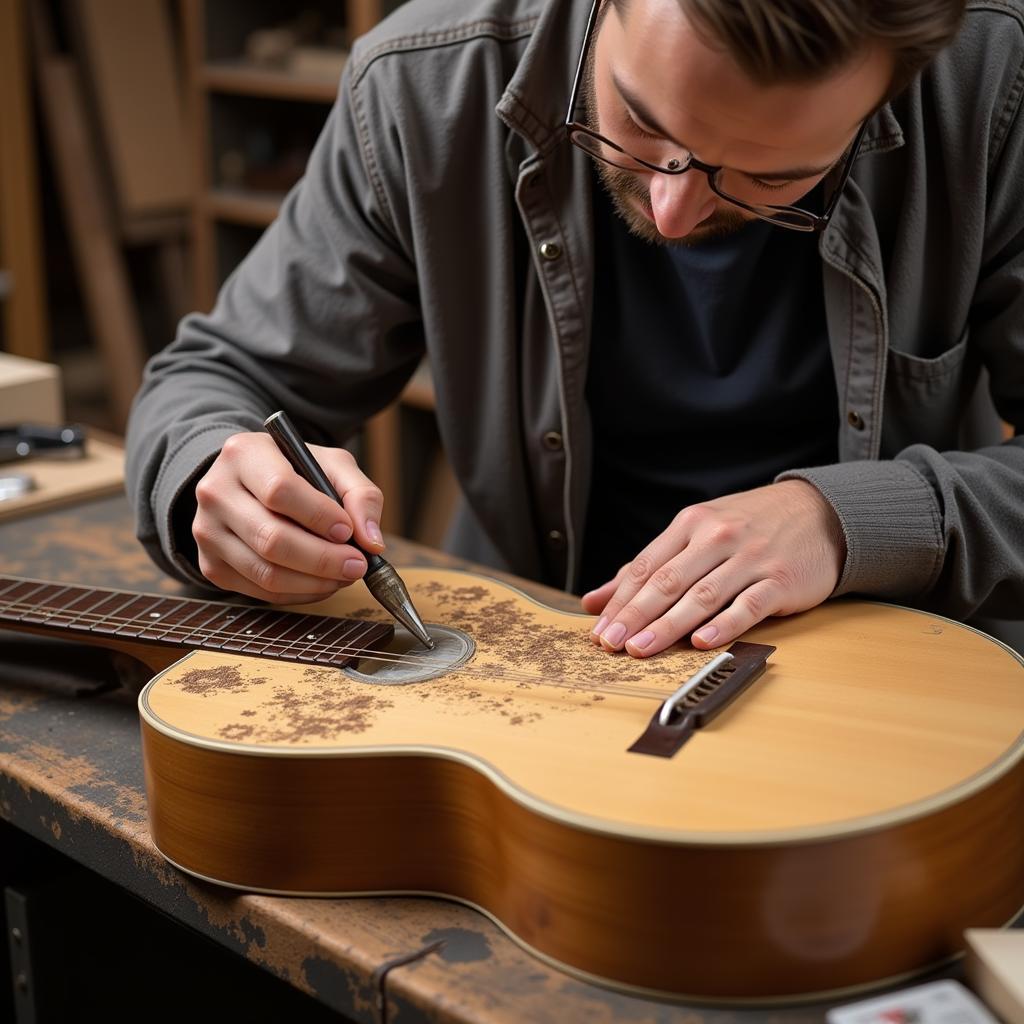Guitar Road Worn: A Deep Dive into the Art of Relic’d Guitars
October 30, 2024Guitar Road Worn finishes have captivated musicians for years, offering the allure of a well-loved instrument without decades of actual wear and tear. These guitars mimic the look and feel of a vintage instrument, allowing players to experience the character and mojo of a seasoned axe straight out of the box. This article explores the world of road worn guitars, examining their appeal, the process behind their creation, and how to choose the perfect one for you.
The Allure of the Road Worn Guitar
Why do guitarists gravitate towards the road worn aesthetic? It’s more than just a visual preference. A road worn guitar tells a story, whispering tales of countless gigs, late-night jam sessions, and years of musical exploration. It’s a visual representation of a life dedicated to music, even if that journey is just beginning. The worn finish, the dings, the scratches – they all contribute to the guitar’s unique personality and character. It’s a rebellion against the pristine, a celebration of the imperfections that make an instrument truly special. The road worn finish invites you to pick it up, play it hard, and add your own chapter to its story.
 Close-up of a road worn guitar finish showing wear and tear
Close-up of a road worn guitar finish showing wear and tear
Crafting the Road Worn Look: From Factory to Finish
The creation of a road worn guitar is a meticulous process, often involving a combination of hand-work and specialized techniques. Manufacturers carefully study vintage instruments, analyzing the patterns of wear and tear that occur over time. They replicate these patterns on new guitars, using techniques like strategically placed dings, carefully applied lacquer checking, and simulated wear on hardware. Some manufacturers even tumble the guitars with small stones to create a more authentically worn feel. This process requires a skilled hand and an eye for detail to achieve the perfect balance between realistic wear and an aesthetically pleasing result. The goal isn’t to make the guitar look damaged, but rather to imbue it with the character and charm of a well-loved instrument.
 Guitar relicing process in a workshop
Guitar relicing process in a workshop
Choosing Your Perfect Road Worn Companion
With a wide range of road worn guitars available, finding the right one can seem daunting. Consider the level of wear you prefer. Some guitars have a lightly road worn finish, suggesting a few years of gentle playing, while others exhibit a heavily road worn look, mimicking decades of hard use. Think about the type of music you play and the overall aesthetic you’re aiming for. A heavily road worn Telecaster might be perfect for blues or rock, while a lightly road worn acoustic could be ideal for folk or singer-songwriter styles. Ultimately, the best road worn guitar is the one that speaks to you, the one that inspires you to create music.
What is the difference between road worn and relic’d guitars?
While the terms are often used interchangeably, “road worn” typically refers to a factory finish designed to mimic the look of a played guitar, while “relic’d” can encompass both factory finishes and custom jobs done by individual luthiers.
Are road worn guitars more expensive?
Road worn guitars can be slightly more expensive than their pristine counterparts due to the extra labor involved in creating the finish. However, they are often less expensive than genuine vintage instruments.
Do road worn guitars sound different?
The road worn finish itself doesn’t directly affect the sound of the guitar. However, some manufacturers may also incorporate other features, such as different pickups or wood types, into their road worn models, which can influence the tone.
How do I care for a road worn guitar?
Care for a road worn guitar the same way you would any other guitar. Regular cleaning and proper storage are essential to maintain its condition.
Can I create a road worn finish myself?
While it’s possible to relic a guitar yourself, it’s a delicate process that requires skill and patience. If you’re not experienced in guitar finishing, it’s best to leave it to the professionals.
Conclusion: Embracing the Journey with a Guitar Road Worn
A guitar road worn is more than just an instrument; it’s a statement. It’s an embrace of the journey, a celebration of the music that shapes us. Whether you’re drawn to the subtle charm of a lightly worn finish or the rugged appeal of a heavily relic’d guitar, there’s a road worn instrument out there waiting to tell your story.
For any assistance, please contact us at Phone Number: 0915117113, Email: [email protected] or visit us at: Hamlet 3, Binh An, Phu Thuong, Vietnam, Binh Phuoc 830000, Vietnam. We have a 24/7 customer service team.